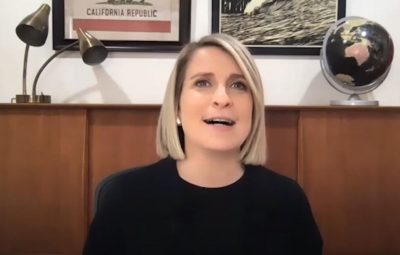The Netflix television series “Dead to Me” is two seasons deep, and recently received approval to film a third. The program’s showrunner — a Boston University alumna — returned virtually to her alma mater Monday to share with students career tips that factored into her success.

Four-time Emmy Award winner Liz Feldman, creator and executive producer of the series, spoke to students via Zoom. The discussion, hosted by BU’s Alumni and Friends, focused on diversity in the industry as well as how to produce impactful and creative work.
Having made a career for herself in TV, Feldman delved into her experiences with harassment as a woman in the industry. She spoke about the way her writing evolved as she journeyed through difficult periods in her personal life.
“I allowed myself to be vulnerable, to go to some really dark places,” Feldman said during the discussion, “and it was this idea that I couldn’t let go of.”
The concept of “Dead to Me” first struck Feldman out of the blue during a pitch meeting. She said she could tell that the team wanted dark humor, so she began telling the story of a widower at a grief group — the basic premise of the show.
Although her idea was initially rejected, Feldman said she knew she wanted to continue working on the pilot.
Writing from the deep place that cultivated her voice in “Dead to Me,” Feldman said, she recognized that her own vulnerabilities with her adversaries helped cultivate a unique script she related to more than any other project. The death of her cousin and her own struggles with fertility were among the issues that put Feldman in a place of grief, she said.
Before “Dead to Me,” Feldman had worked at children’s TV network Nickelodeon at the age 18 for one season. She said she realized after leaving the company, where she was the only female writer, that she had to take a break from writing.
“There were elements that made it a very difficult job and hints of sexual harassment that was happening targeted at me,” Feldman said. “It was discouraging, so I don’t blame myself for having that long pause.”
Haley Zenenberg, a film and television senior in the College of Communication, said she believes the industry is starting to reevaluate its structure and treatment of women, especially in an era encompassing the TIME’S UP organization and #MeToo movement.
“You’re seeing all of this change in Hollywood, where you’re seeing these women reclaiming their stories and reclaiming their voices,” Zenenberg said in an interview. “Women are starting to be the ones making the decisions.”
When it comes to the LGBTQ+ community, which Feldman is a part of, Zenenberg said “Dead to Me” also showcases a new level of diversity in the entertainment industry by integrating an LGBTQ+ story arc.
“While there aren’t necessarily LGBT plot lines in ‘Dead to Me’ until the second season,” Zenenberg said, “I think that when there is that relationship, it’s way more organic and realistic, because it’s coming from someone who is in an LGBTQ relationship.”
COM junior Freddie Hassett, also studying film and television, identified changes he said are needed in the profession that would make the field “fundamentally better for society.”
“The film and TV industry has been, for decades and decades, so heavily dominated by straight white men, and their stories constantly being told,” Hassett said in an interview. “There’s still a lot of work that needs to be done, but I think finally, we’re hearing stories from a much more diverse crowd.”
Both Hassett and Zenenberg said the kind of inspiration that allows the creation of authentic stories like “Dead to Me” must come from personal lived experiences.
Beyond honing one’s writing skills, Feldman said she believes manifestation — envisioning one’s goals and achievements — must come into the creative process.
Her advice to students struggling with completing scripts or finding motivation is to simply “power through” it, to be vulnerable in their writing and to set personal deadlines.
“I’m very motivated by fear. And for me, I don’t have a choice. I have to write a season three,” Feldman said. “I have a proverbial gun to my head.”
For any piece of work, Feldman said, trusting one’s instincts in the process is key to navigating the field, as well as to bolstering a sense of self.
“[There’s] a lot of self-trust that needs to happen, which can be really challenging,” Feldman said. “You just have to jump and know that you’re your own parachute.”
















































































































